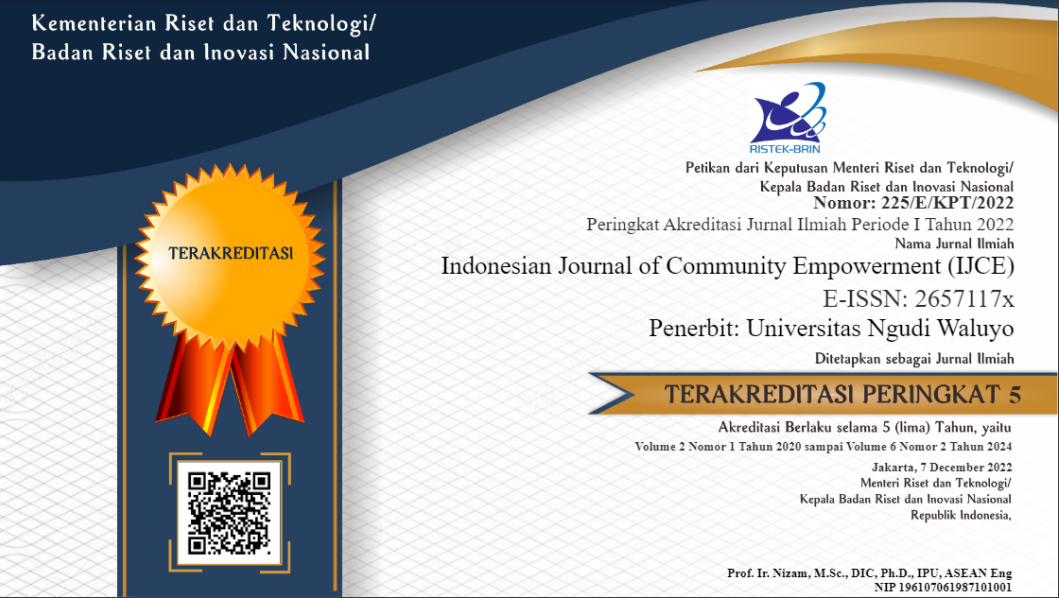Pelatihan Soft Skills Sumber Daya Manusia Kesehatan di SMK Bhakti Medika Wiyata Kristen Magelang
DOI:
https://doi.org/10.35473/ijce.v3i2.1104Abstract
Soft skills are terms related to emotional intelligence, personality traits, social skills, communication, language, personal habits, friendliness and optimism that characterize a person's ability to relate to others. These soft skills contribute 80% of a person's success compared to hard skills. An exploratory study of 130 industries in 16 provinces in Indonesia, shows that the biggest gap between the competencies needed by the business and industrial world and the competencies of health vocational high school (SMK) graduates is in aspects of soft skills such as: honesty, discipline, communication, initiative and teamwork. Soft skills should be built as early as possible, to prepare health human resources with character. SMK Bhakti Medika Wiyata Kristen Magelang organizes vocational nursing and pharmacy with a total of 60 students. These students are prospective health workers. There is a tendency for class XII students to be more daring to cheat (dishonestly) during exams than students of X and XI. Students often delay doing schoolwork and there is still a lot of free time that has not been used optimally so that schoolwork is done less than optimally. This condition if left unchecked will affect the character development of health human resources. The world of work does not only choose prospective workers who are proficient in academic abilities, but pays great attention to skill values including the values of honesty, responsibility, courtesy, discipline, commitment, self-confidence, ethics, cooperation, creativity, communication, and leadership. soft skills). Through this Community Service, students are given soft skills training including time management, effective communication and preparing action plans. Evaluation is carried out during the process and followed for 1 month. Process evaluation is carried out qualitatively, there is a change in knowledge and positive attitudes towards the character of the work that is built.
ABSTRAK
Soft skills adalah istilah berkaitan dengan kecerdasan emosional, sifat kepribadian, ketrampilan sosial, komunikasi, berbahasa, kebiasaan pribadi, keramahan dan optimisme yang mencirikan kemampuan seseorang dalam berhubungan dengan orang lain. Soft skills ini memberikan kontribusi 80% keberhasilan seseorang dibandingkan dengan hard skills. Penelitian eksploratif 130 industri di 16 provinsi di Indonesia, menunjukkan kesenjangan terbesar antara kompetensi yang dibutuhkan oleh dunia usaha dan industri dengan kompetensi lulusan SMK adalah pada aspek soft skills seperti : kejujuran, kedisiplinan, komunikasi, inisiatif dan kerjasama tim. Soft skills hendaknya dibangun sedini mungkin, untuk mempersiapkan sumber daya manusia kesehatan yang berkarakter. SMK Bhakti Medika Wiyata Kristen Magelang menyelenggarakan kejuruan keperawatan dan farmasi dengan jumlah seluruh siswa 60. Para peserta didik ini merupakan calon tenaga kesehatan. Ada kecenderungan siswa kelas XII lebih berani menyontek (tidak jujur) ketika ujian dibandingkan siswa X dan XI. Siswa sering menunda mengerjakan tugas sekolah dan masih banyak waktu luang yang belum digunakan dengan optimal sehingga tugas sekolah dikerjakan kurang maksimal. Kondisi ini apabila dibiarkan akan berpengaruh terhadap pembangunan karakter sumberdaya manusia kesehatan. Dunia kerja tidak hanya memilih calon pekerja yang cakap dalam kemampuan akademik saja, tetapi sangat memperhatikan nilai-nilai kecakapan diantaranya nilai kejujuran, tanggung jawab, sopan santun, disiplin, komitmen, rasa percaya diri, etika, kerjasama, kreativitas, komunikasi, dan kepemimpinan (soft skills). Melalui Pengabdian Kepada Masyarakat ini siswa-siswi diberikan pelatihan soft skills meliputi manajemen waktu, komunikasi efektif dan menyusun rencana aksi. Evaluasi dilaksanakan saat proses dan diikuti selama 1 bulan. Evaluasi proses dilaksanakan secara kualitatif, ada perubahan pengetahuan dan sikap positif terhadap karakter kerja yang dibangun.
References
Abbas, R., Abdul Kadir, F. A., & Ghani Azmie, I. A. (2013). Integrating Soft Skills Assessment Through Soft Skills Workshop Program For Engineering Students At University Of Pahang: An Analysis. International Journal of Research In Social Science, 2(1), 33-46.
Agarwal, N., & Ahuja, V. (2014). Preliminary Exploration of Significance of Soft Skills in Groups with Specific Reference to Peer-Assessment. Journal of Management Policies and Practices, 2(2), 85-97.
Al Abduwani, T. A. (2012). The Value And Development Of Soft Skills: The Case Of Oman. International Journal of Information Technology and Business Management, 2(1), 87-88.
Anthony, S. (2014). Integrating Soft Skills in the Curriculum without Sacrificing Content. Journal for Academic Excellence, 2(4), 1-57.
Choudary, D. V., & Ponnuru, M. (2015). The Importance Of Soft-Skills Training For Mba Students And Managers. Abhinav International Monthly Refereed Journal of Research in, 4(11), 6-14.
Dharmarajan, P. (2012). The Significance of Inculcating Soft Skills n Students in the Pprocess of Teachinard Skills. International Journal of Applied Research & Studies, 1(2), 1-14
Karthi, L., & Mahalakshmi, M. (2014). Softskills Through Elt Classrooms. Research Journal of English Language and Literature(3), 328-331
Lavy, I., & Yadin, A. (2013). Soft Skills An Important Key for Employability in the Shift to a Service Driven Economy" Era. International Journal of e-Education, eBusiness, e-Management and e-Learning, 3(5), 416-420.
Paolini, A. C. (2015). School Counselor’s Role in Facilitating the Development of Students’ Soft Skills: Intrapersonal and Interpersonal Attributes to Promote Career Readiness. Global Journal of Human-Social Science, 15(10), 1-10.
Rahayu, S. (2013). Soft Skills Attribute Analysis In Accounting Degree For Banking. International Journal of Business, Economics and Law, 2(1), 115-120.
Ramlall, S., & Ramlall, D. (2014). The Value of Soft-Skills in the Accounting Profession: Perspectives of Current Accounting Students. Advances in Research, 2(11), 645- 654.
Vyas, P., & Chauhan, G. S. (2013). The Preeminence Of Soft Skills: Need For Sustainable Employability. Journal of Social Science & Interdisciplinary Research, 2(5), 124- 131
Fathurrohman, M. (2015). Model-Model Pembelajaran Inovatif. yogyakarta : AR-RUZZ MEDIA.
Baharudin Hasan.2015. Penerapan Pembelajaran Aktive Learning Untuk Meningkatkan Hasil Belajar Siswa di Madrasah. Jurnal Pendidikan Paedagogik. Vol 1(1).
Bensley,Robert J & Fisher, Jodi B. 2009.Metode Pendidikan Kesehatan Masyarakat. Jakarta;EGC
Dewi RNVR, 2010. Hubungan Penggunaan Media Massa Dengan Tingkat Pengetahuan Kesehatan Reproduksi Pada Remaja Di Sman 8 Surakarta. Skripsi. https://eprints.uns.ac.id/10322/1/153992108201005581.pdf
Maulana, HD.J. (2009).Promosi Kesehatan. EGC.Jakarta
Notoatmodjo,Soekidjo. (2012). Promosi Kesehatan dan Perilaku Kesehatan. Jakarta;Rineka Cipta.
Retamero.Cokely. (2013). Communicating Health Risks with Visual Aids.SAGE Journals. Vol 22,Issues.392-399
Saputro DNAA, (2015). Pengaruh Promosi Kesehatan Tentang Kesehatan Reproduksi Terhadap Pengetahuan Dan Sikap Remaja Tentang Seks Pranikah Di Sma Muhammadiyah 4 Kartasura. Naskah publikasi. eprints.ums.ac.id/36817/1/Naskah%20Publikasi.pdf
Sinaga E,dkk.(2017). Manajemen Kesehatan Menstruasi. Universitas Nasional. IWWASH. Global one.
Sulaeman ES.(2013). Promosi Kesehatan Teori dan Implementasi Di Indonesia. Surakarta;UNS Press



